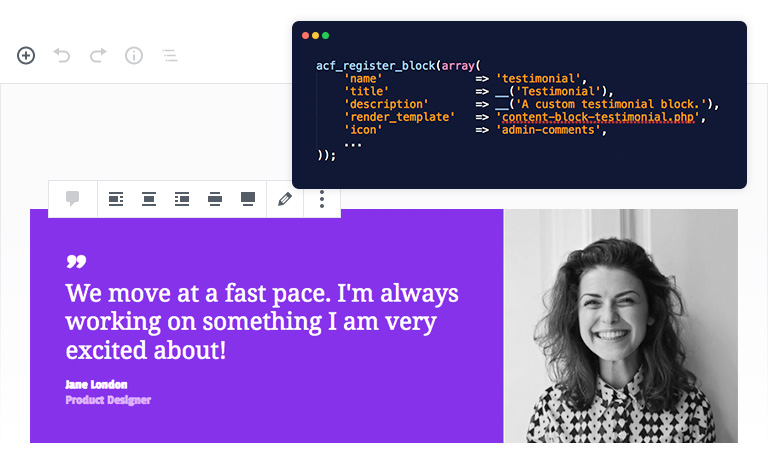After six months in development, Advanced Custom Fields 5.8.0 was released yesterday with a new PHP-based framework for developing custom Gutenberg block types. ACF Blocks was announced in October 2018, to the great relief of many developers who didn’t know how they were going to keep pace with learning the JavaScript required to use WordPress’ Block API.
ACF’s creator, Elliot Condon, was one of the more vocal critics of Gutenberg leading up to its inclusion in WordPress 5.0. Developers were concerned about whether or not their custom metaboxes generated by ACF would still be compatible. The ACF team worked to ensure the plugin was integrated into the Gutenberg UI as much as possible and surprised users by announcing an acf_register_block() function that would allow developers to use PHP to create custom blocks.
The new ACF Blocks add-on is built on top of Advanced Custom Fields Pro and does not require any JavaScript knowledge. It integrates with custom fields so developers can create custom solutions. ACF blocks are rendered using a PHP template file or a callback function that allows full control of the output HTML and live previews while editing the blocks. They also maintain native compatibility with WordPress core, meaning that all Gutenberg features like “alignment” and “re-usable blocks” work as expected.
Early feedback indicates that ACF Blocks has made custom Gutenberg development more approachable for developers who are not as well-versed in React, significantly speeding up the creation of custom blocks.
ACF Pro 5.8 for #WordPress makes Gutenberg block development a breeze! Here's a staff block I made in less than 30 mins. @wp_acf #ACFBlocks #wordpressdeveloper #Gutenberg #reactjs #webdevelopment #webdeveloper pic.twitter.com/VqewoKkcSt
— Sam Kent (@sam_kent_) May 9, 2019
This is one example of how the WordPress product ecosystem continues to evolve to support developers in the transition to a more JavaScript-powered WordPress.
ACF Blocks also launched with a suite of nine ready-to-use bocks available as a plugin from the new acfblocks.com website. These include commonly-requested functionality for client sites, such as testimonial, team, multi-button, star-rating, pricing list, and click-to-tweet, with more on the way.

The “ACF Blocks” on org and with domain acfblocks.com is an independent product from the original “Advanced Custom Fields”, but it requires it.
I know that the naming of “ACF Blocks” for a plugin here is not ideal. Just would mention that these are 2 different devs/ products.